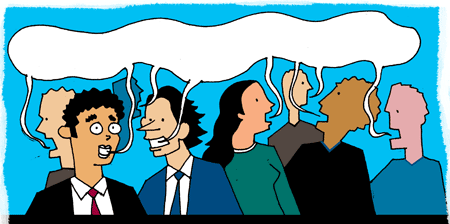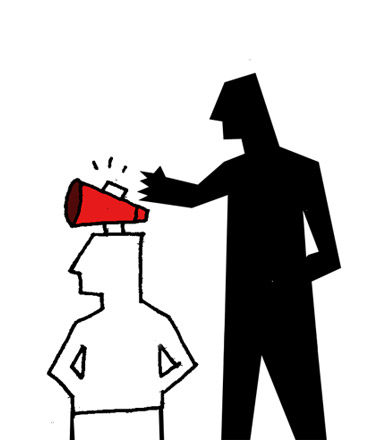Viraja D Vakada, College Affairs
From the ones waiting to pounce on an idea to the ones who succeed in creating trouble, here are some species of aspirants you will meet in a group discussion round. Illustration by Uttam Ghosh and Dominic Xavier
Be it a b-school selection process or a job interview elimination process, one of the most commonly used method by the selection/elimination panel is group discussion.
Group discussion, as the name itself suggests, is a discussion and not an argument or a heated debate.
The panel here is looking at the group dynamics and how well each member is contributing to the discussion to collectively arrive at the conclusion.
In any group discussion, you would meet different type of participants.
If I have to classify them, there would be six types of participants and I have named them too.
1. The Jumpers
Jumpers are those who are waiting to jump into a discussion as soon as the topic is given. Perhaps, being the first speaker in the discussion is the only motto of their life.
They list down all their points and the moment the green signal is given, even before others lift their heads, these guys are on their toes.
Well, it is at times appreciated when you are the first speaker as the first speaker is the one who gives a direction to the discussion.
However, it can act against you, if you just go on speaking without giving other members a chance.
What you must do:
Well, in case you are the first speaker, put forward two to three strong points and then leave the stage to others.
You can always add to others points at a later stage. Remember, more than your individual strength, it is your group participation that gets scored.
Please click NEXT to continue reading...
6 types of candidates you'll meet in a GD round
2. The Troublemakers
Troublemakers in my opinion are those who come with the perspective that a group discussion is a stage to showcase their arguing skills.
All, they want to do is negate every statement made by others and mind you, they do not do it softly.
All they want to achieve is prove others wrong and justify themselves.
Most of the group discussions which consist of three to four troublemakers makes up for a mini-fish-market.
What you must do:
Obviously, try not to be a trouble-maker. Be open to others' suggestions.
6 types of candidates you'll meet in a GD round
3. The Balancers
If I have to give them another name, I would call them the "smarties".
They are never the jumpers. They are never the troublemakers. They pitch in only when they feel it is the "right" time to enter the discussion.
You would mostly see them saying -- "I agree to what Mr Ravi said" and then they end it with a sentence, which would be the jumbled version of what Mr Ravi just stated.
What you must do:
You can always say, "Adding to what Mr Ravi said..." and then put your own points.
Having your own viewpoint holds weightage in any group discussion.
6 types of candidates you'll meet in a GD round
4. The Interrogators
These are the most interesting people I have ever met.
Not sure if they have any point to make, but they are always seen speaking in a group discussion, oops, not speaking but questioning.
Any point made by any members gets questioned by this type. Perhaps, they try to get into the shoes of a moderator.
What you must do:
If you belong to this category, then it's time to change. Have your own opinion.
Questioning others is fine as long as you are able to put up the facts.
Remember, it is still a discussion. You have to show some teamwork here.
6 types of candidates you'll meet in a GD round
5. The Silencers
They need no introduction. They are silent throughout the discussion.
Some are silent because they do not get a chance to speak. This happens when there are very aggressive speakers in the group.
Some are silent because they feel all their points have already been spoken.
The rest, I would divide into two groups, those who are silent because they are clueless about the topic and the others who perhaps, wish to get eliminated in the GD. (You see, they have their own problems).
What you must do:
Only, in rare cases, I have seen the silencers getting selected for the next round.
Well, the situation was that of a fish-market so the moderators thought these were the best among the rest.
However, if you belong to this type, try to summarise the discussion. You have heard others and speaking for at least a minute will not be a problem at all.
Those, who chose not to speak, I suggest, they do not participate in a process which is not of their interest.
6 types of candidates you'll meet in a GD round
6. The Leaders
Leaders are those, who have actually understood the essence of a group discussion.
If you are a leader, you would always try to get back the discussion on the right track in case there are deviations.
You try to help others by giving them a chance to speak.
If you notice someone not getting a chance to speak, as a leader, you would ask the group to give that person the opportunity to speak.
If there is an argument during the discussion, you would try to calm the participants.
What you must do:
As a leader, you need to understand cues from others. There might be a person sitting silently, not because he is not getting a chance, but because he simply does not have a point to add.
In such a case, asking his opinion, just to prove that you are a leader can land the other person into a uncomfortable position.
Instead, you can ask that person to summarise the whole discussion at the end.
So which type do you fit in?
Once, you know the answer, you now know how you can correct yourself.








Comment
article